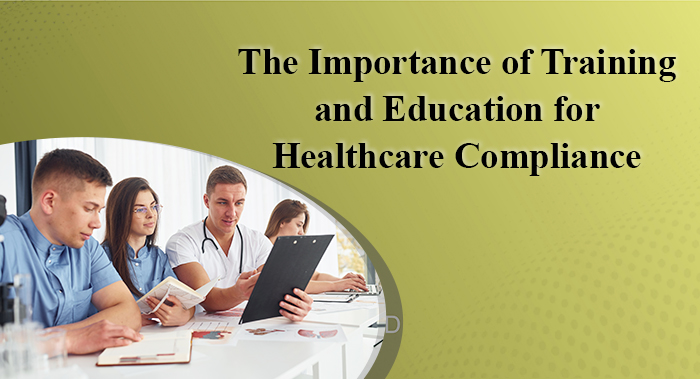
The Importance of Training and Education for Healthcare Compliance
Healthcare compliance is essential to staying informed about changing laws, regulations, and the best practices needed to achieve it. Preventing fraud and maintaining ethical standards in healthcare services and patient care is essential. Consequently, providing healthcare employees, staff, and personnel with proper training in healthcare compliance is essential.
A recent study predicts that the global market for medical personnel will reach $11.4 billion by 2027, which indicates a very high recruitment number. However, the employees must be well-trained to get up to the mark for all industry standards and compliance requirements.
Healthcare organizations worldwide are evolving with the challenge of needing more well-trained staff dedicated to the dynamic nature of the healthcare industry. Continuous changes and updates in industry treatments require ongoing efforts to ensure that healthcare professionals have the skills and knowledge to keep up with industry updates and compliance demands. These involve strategies like attending healthcare compliance webinars to learn about all the recent changes.
Enter healthcare compliance training – a structured approach to empower employees with the expertise to adhere to regulatory compliances and ethical standards. This training encompasses programs designed for medical professionals and staff, covering skills such as handling medical equipment, delivering quality patient care, and proficiently managing software and technology, including administrative systems.
Ensuring healthcare compliance training is crucial for overcoming various challenges healthcare organizations face. Let's delve into key barriers and why practical training is indispensable:
1. Clinging on the classic methods
Many healthcare settings cling to traditional practices, relying on physical and paper records. The transition to managing healthcare software may encounter resistance due to unfamiliarity, particularly with advanced features like artificial intelligence (AI). However, studies show that many healthcare providers advocate for digitized facilities. Healthcare compliance webinars address this resistance by familiarizing professionals with the technology and making tasks more straightforward.
2. Management work :
Healthcare compliance often translates to increased administrative responsibilities, straining establishments with limited time and resources. This can impede the efficacy of compliance training. However, training programs equip employees to handle administrative tasks more efficiently. By improving time and cost-effectiveness, training becomes an essential tool for navigating high patient loads and constraints.
3. Concerns about technical or tech-friendly employees.
Technical challenges, such as software maintenance, errors, and updates, can pose hurdles in compliance training. However, a robust learning management system and training software can streamline this process. Moreover, healthcare laws are ever-evolving. Healthcare compliance webinars offer the advantage of easy updates, ensuring alignment with the latest requirements.
In Conclusion:
Healthcare compliance training is pivotal for staying abreast of evolving requirements. It empowers employees to navigate industry adeptly changes, fostering a responsive and resilient medical establishment. At Hurix, we offer training and workforce learning solutions, incorporating engaging features like game-based learning, simulations, and scenarios. Elevate your healthcare workforce with healthcare compliance webinars.
Many organizations can help you stay compliant and updated with all the regulatory changes.
U.S. Department of Health and Human Services (HHS): The HHS website provides comprehensive information on HIPAA regulations, including the Privacy Rule, Security Rule, Breach Notification Rule, and Enforcement Rule. It offers guidance documents, FAQs, news updates, and resources to help healthcare providers and organizations understand and comply with HIPAA requirements. The OCR, a division of HHS, oversees HIPAA enforcement.
Office for Civil Rights (OCR): The OCR enforces HIPAA regulations. Their website offers guidance, educational materials, news updates, and information on recent enforcement actions. Subscribing to OCR's email updates can provide timely notifications about regulatory changes and direction.
Healthcare Information and Management Systems Society (HIMSS): HIMSS is a global organization focused on healthcare technology and information management. They provide resources, educational events, webinars, and publications related to healthcare IT, including HIPAA compliance and regulatory updates.
American Health Information Management Association (AHIMA): AHIMA is a professional association for health information management. They offer resources, webinars, conferences, and publications that cover various aspects of health information management, including HIPAA compliance and regulatory changes.
American Medical Association (AMA): The AMA provides resources, educational materials, and updates on healthcare policies and regulations, including HIPAA. Their website and publications cover legal and regulatory issues impacting healthcare providers.
HealthIT.gov: HealthIT.gov, maintained by the Office of the National Coordinator for Health Information Technology (ONC), provides information, resources, and updates on health information technology, interoperability, and regulations like HIPAA.
Healthcare Compliance Association (HCCA): The HCCA offers resources, conferences, webinars, and publications on healthcare regulatory compliance. They cover various regulatory topics, including HIPAA compliance and updates.
State medical boards and associations: State-specific medical boards and associations often provide resources, newsletters, and updates related to healthcare regulations, including HIPAA. Checking your state's medical board or association website can help you stay informed about local regulatory changes.




